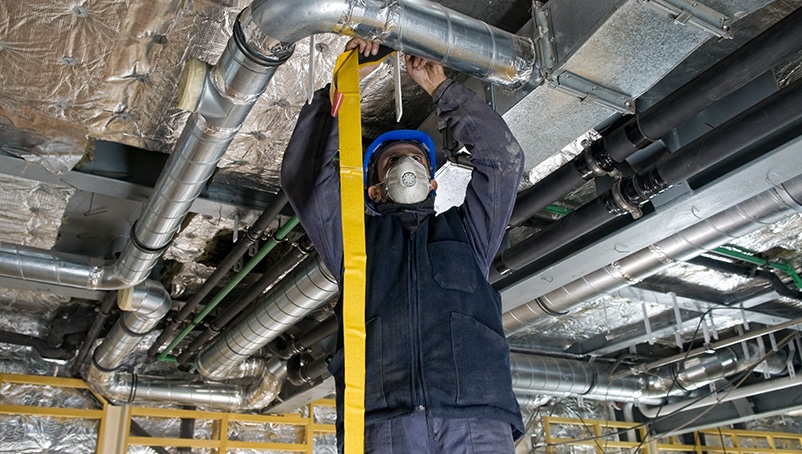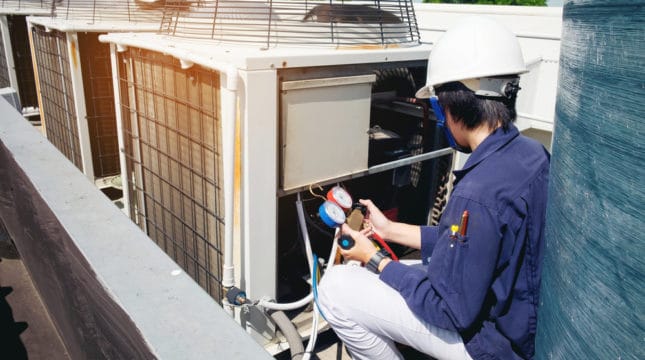How to get an HVAC license in Texas
To obtain a Texas HVAC contractors license, you must pay a $115 licensing fee and fulfill one of the following experience requirements:
- Have at least four years of experience working under the guidance of a licensed HVAC contractor within the past six years.
- Hold a technician certificate for the past 12 months and have at least three years of experience working under the guidance of a licensed HVAC contractor within the past four years.
- Qualify for an experience exception based on education or training in a similar field.
Contractors may qualify for a full or partial exemption of the experience requirements by earning an HVAC degree or certification, holding an engineering license, demonstrating related military experience or fulfilling other apprenticeship programs.
HVAC license classes and endorsements
On the application for an HVAC contractor’s license, you must select a combination of license class and endorsement. Your options will affect which licensing exam you take, the insurance coverage you need and the equipment you can service.
There are two license classes:
- Class A license. Class A license holders are not limited in the size of equipment they can service.
- Class B license. Class B license holders can only take jobs on cooling systems if the cooling capacity per unit is less than 25 tons and on heating systems if the heating capacity per unit is below 1.5 million BTUs/hour.
In addition, there are three license endorsement options:
- Environmental Air Conditioning
- Commercial Refrigeration
- Process Cooling or Heating
Contractors with Commercial Refrigeration/Process Cooling or Heating endorsements can only work on coolers, freezers, ice machines and other units with built-in temperature and humidity controls. Contractors with Environmental Air Conditioning endorsements can work on all equipment, including circulation and ventilation systems.
If you already have the necessary experience or education to meet the application requirements, you should expect the process to get your HVAC contractor license in Texas to take approximately four to six weeks. Once you submit the completed application, it will take approximately seven to 10 days to receive the testing information from PSI Exams and schedule your test.
After passing your exam, PSI will send your scores to TDLR, which will issue your license within three weeks.
If you have a completed application, payment of fees and passing scores on file, the licensing department can issue you a temporary license valid for 21 days or until you receive your official license.
Texas HVAC license requirements
To work in air conditioning and refrigeration in Texas, you must have a license. Texas offers the following three pathways for licensing:
1. Texas registered technician
The registered technician license allows you to assist a licensed HVAC contractor in performing repair work.
To qualify, you must be at least 18 years old, complete an application and submit a $20 application fee. No experience or education is required, but you can only work under the guidance of a licensed HVAC contractor.
2. Texas certified technician
The certified technician license demonstrates that you meet higher standards of experience and education than a registered technician. However, you still must work under the supervision of a licensed air conditioning and refrigeration contractor. You also can’t advertise your air conditioning and refrigeration services.
To become a certified technician, you must be at least 18 years old, complete an application and submit a $50 application fee.
Additionally, you must meet one of the following requirements:
- Have two years of experience working under a licensed HVAC contractor
- Complete a TDLR-approved HVAC certification training program consisting of 2,000 hours of combined instruction and practical experience within the past four years
Military experience can also count toward the experience requirement.
After submitting your application and meeting the requirements, you’ll need to take and pass an HVAC licensing exam to become fully certified.
3. Texas HVAC contractor license
HVAC professionals who plan to provide air conditioning and refrigeration services independently must hold an HVAC contractor’s license in Texas.
To qualify, you must:
- Be at least 18 years old
- Meet the necessary education or experience requirements
- Hold the right license class and endorsements for the units you plan to service
- Submit the application
- Pass the exam
- Pay the required fees
- Submit proof of insurance






